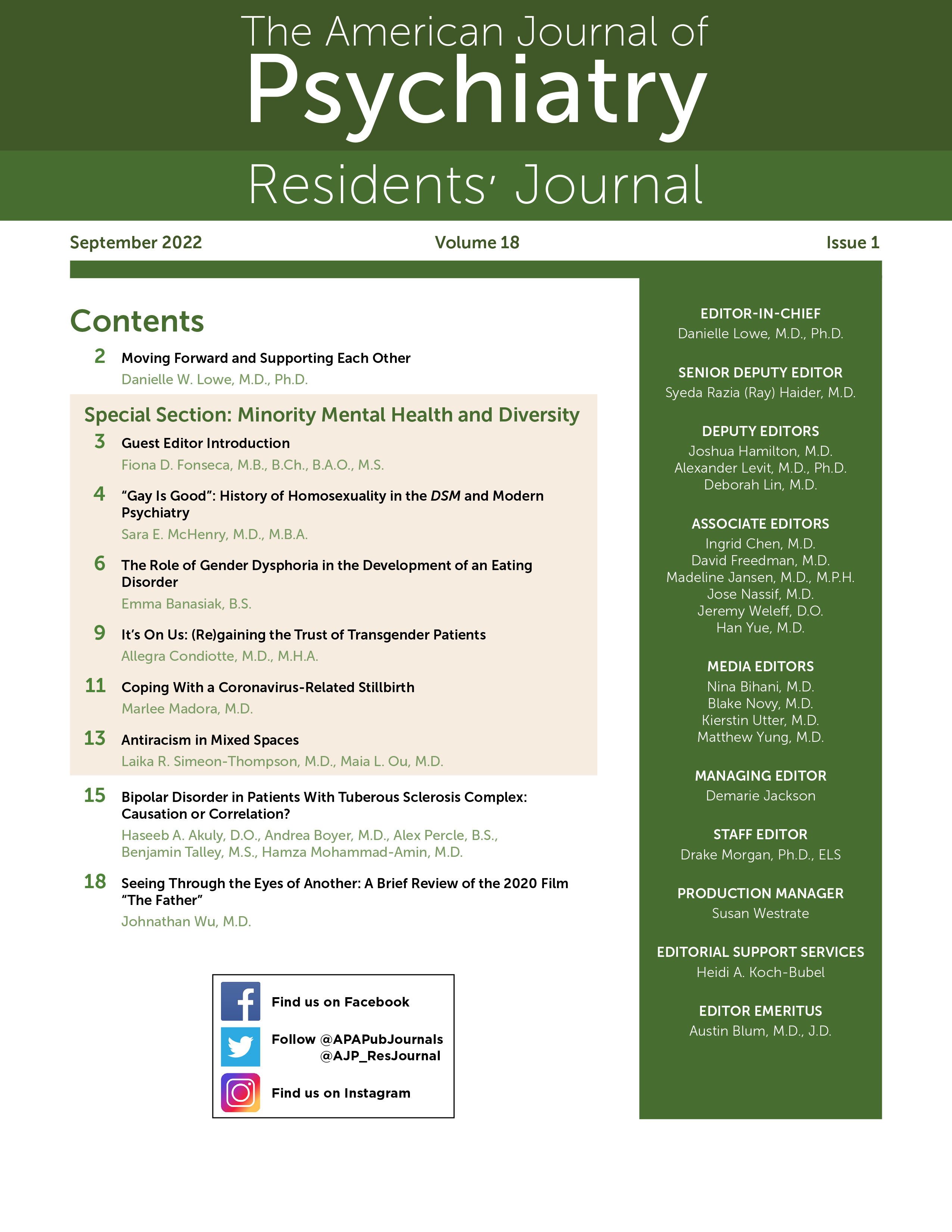Antiracism is an ideology and way of life that involves dismantling “policies that produce or sustain racial inequity” (
1). In psychiatry, this includes challenging explicit and implicit racism, promoting inclusivity within leadership, and interrogating racial disparities in diagnoses (
2). Although some may see racism as binary, antiracism is a journey. Some sit in their homes, unaware of race. Some stand in their walkways, ready to retreat inside. Some have walked a thousand miles. Racial equity requires collaboration with allies at different stages. To describe those at intermediate stages, we propose the novel terms “walkwayers” (those early in their antiracism journey and less aware of the effects of systemic racism) and “partwayers” (those engaged in some antiracist activities and aware of systemic racism but who still have significant blind spots). Performing antiracist work in mixed spaces, which contain walkwayers and partwayers, creates a variety of challenges for us as Black, Indigenous, and people of color (BIPOC) individuals.
Walkwayers require significant guidance from those further in their journeys. They may prioritize their comfort over antiracism, play devil’s advocate, and intellectualize racial trauma. For example, a White attending physician may overlook a patient’s racist behavior toward a BIPOC trainee because of an unwillingness to confront this racism. The physician may question whether the BIPOC trainee’s behavior may have invited hostility from the patient. The physician may ignore or challenge allegations of racism unless flagrant racism has occurred, compelling BIPOC trainees to elaborate on traumatic personal experiences. This exposes us to examination, judgment, and dismissal.
Partwayers are engaged in antiracist efforts but may expect gratitude for minimal work when their privilege empowers them to do more. They often become defensive when their blind spots are pointed out. As an example, at a meeting of a Black student medical association, a White attending physician disparaged the association’s outreach efforts to a non-Black POC community that was recently affected by a crisis. The attending physician implied that the students’ efforts were too generalized or unfocused and assumed that the association would direct its energy only toward Black communities. At a subsequent meeting with BIPOC trainees, the physician was presented with information about why this assumption was wrong; however, the physician continued to justify his or her actions rather than apologize. It is racist to tell BIPOC individuals how they should feel and which communities they should reach out to. It is racist for a White attending physician in a position of power to use so much space during a meeting with BIPOC trainees, when time is limited, and to expect to teach while rejecting any attempts to learn. After the meeting, the trainees expended energy to confront this racism and evaded typical reactions of indifference, defensiveness, and indignation, which prioritize White comfort at the expense of BIPOC safety. The attending physician became offended and disengaged from student antiracism efforts.
Situations such as this leave us burdened with the task of replacing a former ally’s efforts and concerned that other allies will leave if challenged. We cannot run home when we feel upset. Racism follows us and hurts us wherever we go. Partwayer allies can hold their allyship hostage, leading to resentment among BIPOC trainees. How do we process White allies’ unfiltered reactions to our pain, and the defensiveness that often follows, while managing our own hurt and anger?
How do we find the energy to attend to our responsibilities and act “professionally” as we process these painful interactions? By being completely honest, we risk making White allies uncomfortable and driving them back home. By catering to their comfort, we drain our energy for those who may abandon their journeys regardless of what we say. We may wonder whether those who compel us to walk on eggshells should be involved in this work at all. At such times, we must remember that White allies are critical to achieving racial equity. Today’s walkwayer may become an invaluable ally.
How, then, can BIPOC trainees function in mixed spaces? We must protect our energy, prioritize survival, and be judicious about when and how we risk our jobs. Getting fired does not advance antiracism. We cannot do antiracist work while burnt out or in crisis. Surviving in spaces that are designed to exclude us is an act of rebellion. We cannot expect to teach everyone everything. Some people need to hear the same thing dozens of times from different people. Sometimes, expressing our pain and giving allies opportunities to grow and figure out solutions are enough. We can be kind without bending over backward to avoid White tears and White discomfort.
